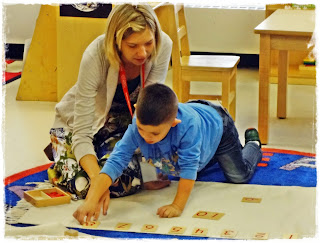When you think back to your years in school, you may think of the teachers in the front of the class going on and on and on about a lesson. After that you were handed a work sheet or asked to open your text book and answer questions to turn in to the teacher to be graded. Then you were given homework to review the lesson. And finally, you had a quiz to validate your retention of the lesson and if you did poorly, “Oh Well” move on to the next lesson anyway. If you can relate, then you were not in a Montessori school. The Montessori Method, developed over a hundred years ago by Maria Montessori, is a hands-on individualized style of learning. That means every student works with enticing manipulatives at their own pace!
Think about how different every 7 year old is and the strengths and weaknesses each one possesses. In a Montessori classroom every child is working at their own pace and that 7 year old also has classmates that are 6 and 8 years old. Lines of age-appropriate expectations are blurred and pressure to perform is reduced in this multi-aged setting. A classroom community is formed where strengths are encouraged and weaknesses are supported by not only the teacher but classmates too!

Montessori teachers are trained to manage a full classroom of students, monitor their progress and allow them plenty opportunities for growth. Montessori teachers learn to teach multiple grades to accommodate all the way from low to high learners without the labels of learning disability or gifted. Emily Farley, Kindergarten teacher at Monarch Montessori of Denver Charter said, “Classrooms are not driven by norms, but by the pace of each child and this allows students as much time needed to understand a lesson.” When asked about the differences for Montessori verses traditional Emily stated, “It requires more organization, longer planning time, since I am planning for each child and I observe to record progress for each child rather than grading completed work.”
Individualize Instruction is a sure-fire way to keep a child from falling through the educational cracks. Learning plans are developed for every single child to succeed whether they have learning disabilities, highly gifted or anywhere in between. At Monarch Montessori of Denver we pride ourselves in providing a security net for all children.

No comments:
Post a Comment